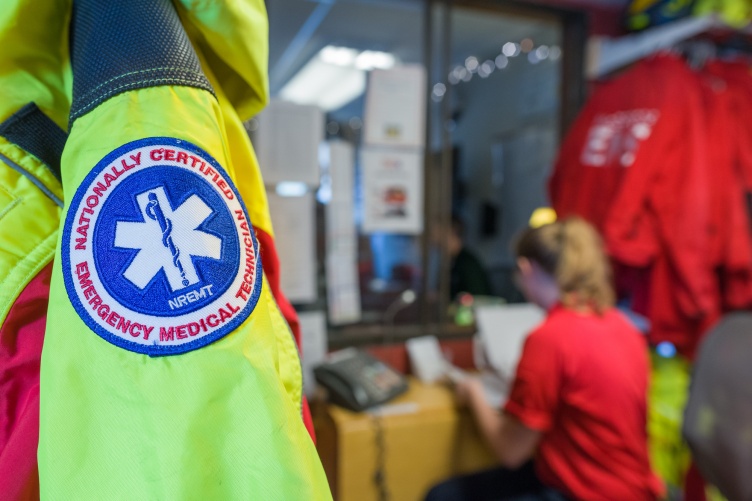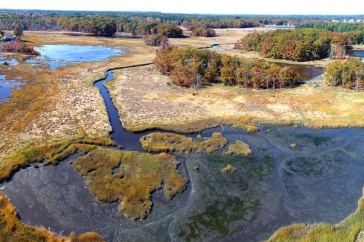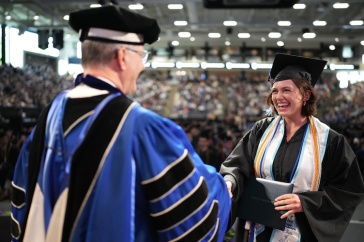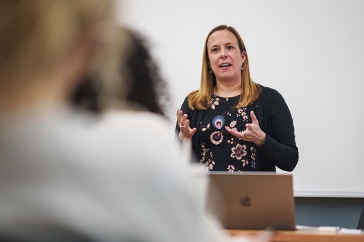
In March of 2020, when the fear wrought by COVID-19 shuttered the UNH campus and sent students home to the safety of their high school bedrooms, Shannon Larkin ’16 ‘21G regularly closed herself into a tiny space with some of the sickest coronavirus patients, shielded only by used personal protective equipment.
Carolyn Mercuri ’23 commuted two hours from her hometown of Franklin, Massachusetts, to Durham to do the same.
Larkin and Mercuri are among the 34 student volunteers who help power McGregor Memorial EMS, the primary ambulance service for Durham, UNH, Madbury and Lee. And even when COVID was at its worst, these students showed up to care for the community.
“People rely on us. If nobody wants to come in, there’s no ambulance,” says Mercuri, a medical microbiology major on a pre-physician assistant track. “It’s a privilege to care for this community.”
Not only did McGregor’s student-volunteers, who comprise about half the service’s staff, continue volunteering, they gave a record amount of their time in 2020: more than 40,000 hours, an increase of 5,000 hours from the previous year, according to McGregor executive director Chris Lemelin ’06 ‘11G. “They said ‘we are health care providers, this is what that’s all about, people need us.’”
Not that it was easy. In the early days of the pandemic, Lemelin recalls, cases were exploding in Boston and New York, much about the disease and how it spread remained mysterious and personal protective equipment (PPE) was scarce.
“It was a very stressful time for all of us,” says Mercuri, a two-year veteran of McGregor. “We’re told that this is a deadly disease and then we’re put in the back of a tiny ambulance with likely COVID patients.” For her, the greatest concern was that she might transmit the disease to roommates or her parents. Although Mercuri commuted from her parents’ house for her 24-hour shifts, UNH made Eaton House available to students working at McGregor.
COVID hardly caught McGregor unprepared. In January 2020, before any cases were in the U.S., the service created policies and conducted trainings. Lemelin, who holds a master's degree in public health from UNH, ordered 500 extra surgical masks and patted himself on the back for his foresight and preparation. Those 500 masks turned out to be “an order of magnitude” short of what they needed, he acknowledges.
As the virus spread and guidance shifted, McGregor volunteers scrambled to stay abreast of constantly changing protocols. “You’d be gone for a week then you come in for your next shift and suddenly all of the guidelines have changed,” says Larkin, who receives her M.S. in nursing in July. “It was a lot of learning. We know a lot about infection control already, but now we had to learn how to use the equipment, to clean the equipment, to clean the ambulance.”
Those protocols, which included hood-like powered air-purifying respirators, worked: The service traced no COVID cases among its members to ambulance calls.
Volunteering during the pandemic gave the McGregor volunteers a unique — and often sobering — perspective on a historical event. “The worst thing is watching people suffer,” says Mercuri. “One time we transported to a local hospital and the nurses were saying ‘you’re going to have to wait, we literally don’t have a bed for this patient.’”
Lemelin describes responding to calls to facilities with active COVID cases as “walking into a war zone.”
“I think that affected some of our volunteers very profoundly,” he says.
“When people came for the vaccine they were crying tears of joy. I could feel the world go back to normal right there in the Whittemore Center.”
As COVID vaccinations gained momentum, McGregor’s student volunteers continued stepping up to serve by staffing vaccination clinics. “That was a big, big, big breath of fresh air. We’re used to having people who are in pain, but when people came for the vaccine they were crying tears of joy and taking videos,” says Mercuri. She adds that she was proud of the “enormous” turnout at the UNH student clinics she staffed. “I could feel the world go back to normal right there in the Whittemore Center.”
While it was hardly the traditional student response to COVID, neither Mercuri nor Larkin considered not continuing to volunteer. “A lot of people felt helpless and paralyzed, but working on the ambulance is something familiar,” says Larkin, who joins the nursing staff of Portsmouth Hospital’s intensive care unit after graduation. “It felt like something I could do to keep the world moving at such an unprecedented time.”
-
Written By:
Beth Potier | UNH Marketing | beth.potier@unh.edu | 2-1566
















































